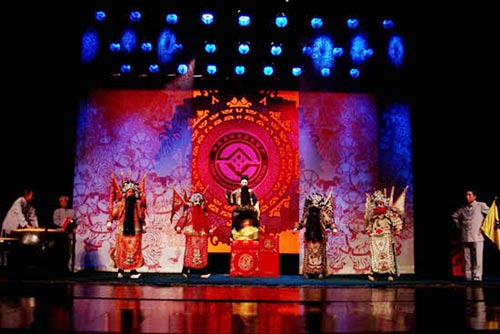 |
|
Hop Opera[www.baidu.com]
|
"There were two unwritten rules for opera actors in our village," explained Dang. "The first one was the inner-village rule. Every troupe performed in their communities only, performing in other villages was forbidden; the second rule was no performing during the busy agricultural season." These rules may be the reason why fewer people are performing the opera today.
Hop Opera is only popular in the villages along the Yellow River of He-yang County, so it has distinct regional features. Compared with Qinqiang, the predominant opera in Shaanxi Province, Hop Opera is older and more primitive. Before the founding of the People’s Republic of China, residents in a dozen villages in the area knew how to perform it. However, today, only Xingjiazhuang retains this art form. Still, as Dang lamented, "Even nowadays, there are only about 20 Hop performers in my community. It’s a far cry from its heyday."
Path of Growth
Raw talent runs deep in the Dang family. Dang Zhongxin’s grandfather and father were both Hop masters in their village. They loved the opera and were good at it, too. Traditionally, Hop actors don’t ask for payment; the local community provides their meals during the performance season and donations of costumes and props. According to Dang, his family were not rich when he was young. But despite their meager means, the family would sell their cottons and crops in order to fund the village opera troupe’s annual performances.
Dang’s fondest memory is of a story told by his father. In the spring of 1949, ordinary folk from his village organized the first Hop show in years to celebrate the end of the war and liberation of the region. It was warmly welcomed by a big audience including PLA soldiers and local farmers. "Whenever he remembered that time, my father would recreate the spectacle of that celebration excitedly and in vivid detail. And from that moment, I dreamt that I would one day perform the opera as well," recalled Dang.
From a young age, Dang would accompany his father to rehearsals. At the performances, he and other young admirers would stand close to the stage, intently watching every move. There wasn’t much in the way of entertainment in rural China back then, so the opera was a big delight. Dang would even skip meals and naps to watch it. "Sometimes the show would last five to six hours. The longest could even take nearly a whole day and night. Even then, I still insisted on watching every scene to the very end," Dang recalled. "If I got hungry, I would grab a steamed bun but never leave my spot near the stage."
It was at these early performances that Dang started copying what he saw. His talent and perseverance helped him to stand out from the crowd. His first performance opportunity came one day when one of the actors quit suddenly. Dang jumped at the chance to fill the spot and was welcomed by the rest of the troupe. "The reception for my first performance was not bad and the experience only increased my love for the opera." Dang was only 10 years old.
He went on to serve an apprenticeship under the famous opera artist Dang Yunlong. In 1964, 17-year-old Dang appeared in a government video. By then, he had already become a leading actor on the scene.
Scripts Salvaged
As with most dramatic art forms, the script is the foundation for the performance. Most Hop scripts were originally hand-written editions passed on from generation to generation. Under the protection of a designated guard, the opera scripts were not allowed to circulate freely among the performers and were only taken out from under lock and key at rehearsals. What’s more, the actors were only given their specific lines and dance routines, which meant that often, they wouldn’t know the complete contents of the script until performance day.
We Recommend:
